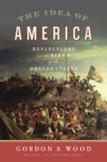In the Beginning
There is a discrepancy between the popular narrative of the American Revolution familiar to most Americans and its academic interpretations. In the popular understanding, a unified group of colonists heroically expelled the foreign British and then quickly agreed on a new plan of self-government that was an instant model for the world. Academic interpretations have stressed how divided the people actually were over the break with Britain and over how to govern themselves afterward. In this book of essays, the Pulitzer prize-winning historian Gordon Wood synthesizes the scholarly interpretations and then attempts to reconcile his own work with the popular understanding.
Three academic interpretations stand out for Wood. The Progressive thesis, named for a political movement of the early 20th century that opposed the concentration of wealth in American life, presented the Revolution as a chapter in a lengthy struggle between a populist majority and an elitist minority for control of society. The populists led the war for independence, the elitists created the Constitution, and the presidencies of Thomas Jefferson and Andrew Jackson solidified the triumph of the common man.
The cold war, with its emphasis on the need for national unity against the Soviet Union, produced a consensus school emphasizing the fundamental unity of the revolutionary generation.
The civil rights movement produced a third school, which emphasized the Revolution as a time of some cultural and social reform that nevertheless further marginalized women, native Americans and African-Americans.
Wood finds each of these theories to be flawed by some historians’ tendencies to view past events in light of the preoccupations of their own days. The Revolutionary generation did the same, as Wood shows in an essay on its selective reading of ancient Rome. This habit, however, is unfair to historical reputations.
Wood insists on treating the American founders as figures of their own time. Consider his comparative essay on Thomas Jefferson and Thomas Paine. Jefferson’s motives in advocating limited government are sometimes reduced to his wish to avoid the abolition of slavery. But Paine, an abolitionist, was one with Jefferson for limited government. Both belonged to a democratic movement that had enormous faith in the capacity of ordinary men for self-rule. Wood also agreed with Abraham Lincoln’s observation in 1858 that Jefferson’s writings on equality created a framework for later generations to use in addressing slavery.
The author’s own view is that the Revolution extended beyond political upheaval to create massive social and cultural change. At its beginning America was a colonial society, hierarchical and patriarchal, and bound together by kinship ties and patronage relationships. At its end, what remained was an incomplete yet advancing democratic society that was much more egalitarian.
For Wood it is a mistake to take sides in political arguments of the past. The better alternative is to determine why participants held the views that they did. Some scholars, for example, deplore a tendency of the revolutionaries to see a British “conspiracy” against colonial liberty, believing that such views are a sign of paranoia. Wood answers that the Enlighten-ment gave these people a belief in an underlying order to all human events. Nothing happened in human society unless some human will, whether malevolent or benevolent, was behind it. To champion chance was to undercut human reason and will. The Enlightenment may have emphasized human initiative far too much, but it did not lead the revolutionaries into mental illness or unreality.
Wood admires the anti-Federalists despite their opposition to the Constitution. He feels that they had a better understanding of future U.S. politics than the Federalists. The anti-Federalists understood that political conflict was natural and that it was generally not desirable to be disinterested in such a conflict. They were quicker than their rivals to understand that impartial figures like George Washington would be the exception rather than the norm in American life.
Still, the Federalists showed great political skill in the way they accomplished the ratification of the Constitution by reaching out to both the intellectual and the popular culture of their time. (If Wood has a bias of his own, it is that today’s separation between academic and popular culture is deplorable.)
Also worth noting is an essay on the emergence of the U.S. judiciary as the defender of individual rights. Alexander Hamilton’s conviction that judges would be best suited to check the potential tyranny of a popular legislative majority was a major change from the English tradition of presenting Parliament as the defender of rights and led toward John Marshall’s vision of a powerful Supreme Court.
Wood argues that republicanism has survived in American life by absorbing some positive aspects of monarchy into the presidency, particularly the capacity to foster national unity, and acquits John Adams of the ridicule he has received for calling the United States “a republican monarchy.”
Finally, Wood shows why the Revolution indeed had the global significance most Americans associate with it. The world’s first Enlightenment nation was founded to celebrate universal human traits, especially the thinking processes of sense and reason. This helped the new nation avoid tribalism, welcome immigrants and develop a humanitarian outlook. Thus arose the world’s capacity to identify with America.
This article also appeared in print, under the headline “In the Beginning,” in the October 3, 2011, issue.








